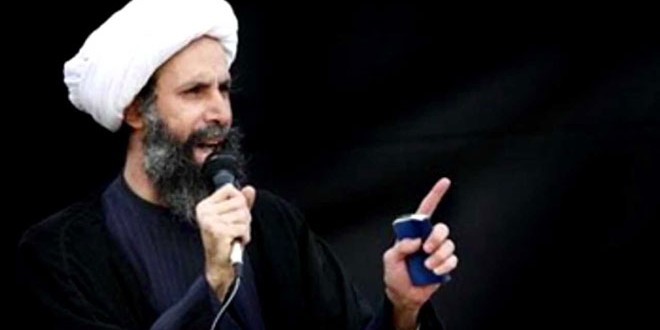Analysis: Saudi executions aimed at silencing dissent
By Adam Whitcomb
January 25, 2016
Washington DC – The executions of 47 Saudi prisoners, including Shia cleric Nimr al-Nimr were used by the ruling family to crush any expression of anti-Saudi sentiment. The ruling Saudi family does not tolerate any sort of dissident narrative within their country, especially from its Shia minority in the Eastern Qatif region where former Sheikh Nimr al-Nimr lived. Every protest occurring in the region has been met by Saudi forces and arrests, including al Nimr’s newphew, Ali al Nimr, who was arrested at the age of 17 and given the death penalty.
Nimr al-Nimr, known as Sheikh Nimr in the Twelver Shia sect, lived in Qatif all his life supporting the community of minority Shia’s living there. He was an extremely popular Shia cleric in Saudi Arabia, often denouncing any suspected ties to Iran by speaking against Sunni and Shia autocratic rulers alike. He was most known for being critical of Saudi Arabia and Bahrain, through his participation in pro-democratic protests and preaching of nonviolence to his community.
In 2009 al-Nimr threatened the secession of the Eastern Province from Saudi Arabia if free elections weren’t established, resulting in a Saudi crackdown in the region which forced him into hiding until his arrest in 2012. Protests continued on in Qatif, Riyadh, and other cities in Saudi Arabia only to be met with the firing of live ammunition and arrests legitimized through Saudi’s Specialized Criminal Court, which operates outside of Shari’a law.
The ruling family has developed the policy to quell political tumult both in Qatif and Bahrain (exemplified by the 2011 uprisings) through riot police and scare tactics; raids and shootings by the Saudi police have now become a part of life in the Shia-majority region. Following the most recent executions, Saudi forces shot at cars and residential buildings to scare citizens in al Awamiyah, the home town of Nimr al-Nimr.
When money and entitlements won’t dissuade Saudi’s from mobilizing, they are replaced by riot police and public executions.
Executions alone will not change the relationship between Saudi Arabia and Western superpowers. The language used by U.S. State Department spokesman John Kirby was clear on the matter:
“…we have expressed our particular concern over the execution of Shia cleric Nimr al-Nimr. We also condemn the attacks on Saudi diplomatic properties in Iran.”
Iran invokes the condemnation of the U.S., but the U.S. concerned with the actions of Saudi Arabia. The rapport the U.S. has built with the Saudi ruling family is too strong and too lucrative to jeopardize over humanitarian crimes alone.
Saudi Arabia is currently the 4th largest importer of weapons in the world due to the multiple conflicts it’s engaged in, in order to fight Iranian influence in the region. This rivalry benefits the public and private sector of nations such as the U.S., Germany, U.K., Canada, and more. If this war machine keeps producing money, why would these nations stop feeding it?
These acts of violence within the past week between Saudi Arabia and Iran resulted in the retraction of diplomatic communication, air travel, and commerce with each other, ultimately deepening the divide between the Western allied and non-allied nations.
With diplomacy and air travel nixed, the sentiment of the hostile “out group” only solidifies in the mindsets of its citizens. Bilateral discussions, as urged by the U.S. State Department, are the first steps of many required to cultivate amicable diplomacy and understanding between Saudi Arabia and Iran, however long or difficult it may be to get to that point
Ultimately, those affected most by these executions are the Syrian and Yemenis. Iran and Saudi Arabia stand at opposite sides of each conflict and the elimination of a narrative between the two nations does not lend to empathetic, negotiable understanding which is necessary to de-escalation. This lack of compromise is often the environment in which terrorist organizations thrive, as al-Qaeda in the Arab Peninsula (AQAP) has already done in Yemen and ISIS in Syria.
When people lose faith in their representative government, they seek representation through a different identity, and the identity of Islamic extremism is one that’s been gaining more traction over the years as geopolitical conflicts become intractable.
Peace talks in Geneva and elsewhere regarding Syria and Yemen can still move forward, and can still be productive given the cooperation of negotiating parties. However previous peace talks were met with rancor between Iran and Saudi Arabia, and unless bilateral dialogue is reopened, it becomes more difficult to see the conflict coming to an end soon.
Adam Whitcomb is a policy analyst at the Institute for Gulf Affairs



Comments are closed.